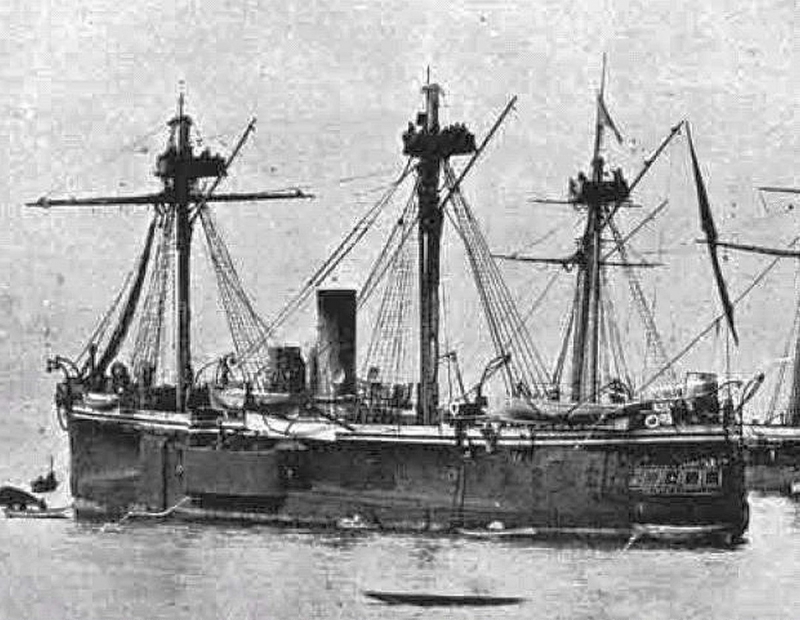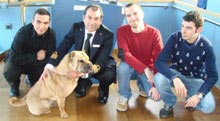| Precedente Successiva |
 |
| Cochrane |
| Name: Cochrane Builder: Earle's Shipbuilding Co., Hull Cost: 2,000,000 pesos Laid down: 1873 Launched: 23 January 1874 Completed: December 1874 Decommissioned: 1933 Out of service: 1908 Reclassified: as training ship, 1898 Fate: Scrapped 1934 General characteristics Class & type: Almirante Cochrane-class ironclad Type: Armored frigate Displacement: 3,480 long tons (3,540 t) Length: 210 ft (64.0 m) Beam: 46 ft 9 in (14.2 m) Draught: 19 ft 8 in (6.0 m) Installed power: 3,000 ihp (2,200 kW) Propulsion: 2 shafts, 2 Trunk steam engines 6 cylindrical boilers Sail plan: Barque rig Speed: 12 knots (22 km/h; 14 mph) Range: 1,200 nmi (2,200 km; 1,400 mi) at 10 knots (19 km/h; 12 mph) Complement: 300 Armament: in 1879: 6 ? 9 in (229 mm) muzzle-loading rifles 1 ? 20-pounder gun 1 ? 9-pounder gun 1 ? 7-pounder gun 1 ? 1-inch (25 mm) Nordenfeldt machine gun Armor: Belt: 4.5?9 in (114?229 mm) Battery: 6?8 in (152?203 mm) Deck: 2?3 in (51?76 mm) Conning tower: 4.5 in (114 mm) Bulkheads: 6 in (152 mm) The armored frigate Almirante Cochrane was a ship of the Chilean Navy in the late nineteenth century. She was built, like her twin, the armored frigate Blanco Encalada, in the UK in 1875. She participated in the War of the Pacific, with her most prominent action being her defeat of the Peruvian monitor Hu?scar in the Angamos naval battle. The Cochrane was part of the forces that defeated President Jos? Manuel Balmaceda in the 1891 Chilean Civil War. Background In 1871 the president of Chile, Federico Err?zuriz Za?artu, initiated a bill in the Chilean congress to authorize the executive to purchase two armored vessels. The bill passed with only with a single opposing vote (that of the former president Jose Joaquin Perez Mascayano), and provided for two medium sized ships (frigates) and that the total cost of the purchase would be 2,000,000 pesos. Construction and operation The Chilean ambassador to the United Kingdom, Alberto Blest Gana, was placed in charge of the project. Blest Gana hired the British ship designer E.J. Reed, a former naval architect to the British admiralty, as technical adviser. The order was placed at Earle's Shipbuilding Co. in Hull, Yorkshire. The frigates were to be named Almirante Cochrane and Valparaiso (the Valparaiso was subsequently renamed Blanco Encalada). The construction of the Cochrane began in April 1872. The ship was launched and sailed to Chile in 1874, before having been completed, because of fears of a potential conflict with neighboring Argentina and Bolivia. The Cochrane arrived at the port of Valparaiso on December 26, 1874, commanded by Captain Coneyin and returned to the UK to be completed in January 1877, after her sister, the Valparaiso had arrived. In January 1878, once the dispute with Argentina had been settled, President An?bal Pinto instructed Alberto Blest Gana to arrange for the sale of the two frigates in order to alleviate the economic crisis that had prevailed in Chile for several years. On behalf of Blest Gana, E. J. Reed offered Cochrane to the UK for the sum of 220,000 pounds sterling, but the British declined. Reed then tried to sell the two ships to Russia, but again without success. She was then rebuilt in 1897-1900 as a gunnery and torpedo training ship. She was scrapped in 1934. Design Principle dimensions The Cochrane was 64.0 m long, with a beam of 14.0 m and a draft of 6.0 m. The hull had a maximum displacement of 3650 t when fully loaded with fuel, fresh water, weapons, ammunition, food and crew. The hull was constructed of iron, held with rivets, and was divided lengthwise into eight compartments (counting piques the bow and stern), by seven iron bulkheads. The bow of the Cochrane had, as was customary in the designs of the late nineteenth century, a sharp spur located 2.0 m (6 ft 7 in) under the waterline and projecting 2.2 m (7 ft 3 in) ahead of the forward perpendicular. She was fitted with a cruiser stern. Armament The Cochrane′s central battery The main armament, which was mounted on the central redoubt (central battery), was six 228 mm (9 in) Armstrong guns divided by three-band, mounted heal Scott central pivot, allowing the bow cannon to fire off the sleeve. The centerpiece fired at an angle of 70 degrees and 35 degrees to bow to stern and the third from the hose to the stern (see picture). Supplementing this was a 20-pounder cannon, and one 9 and one 7 pounders, and a Nordenfeldt machine gun installed in the COFA's ratchet, one-inch-caliber (25.4 mm), which fired a one pound (454 grams) projectile. The Cochrane also had a steam boat which was equipped with a torpedo on a bowsprit. The only time this boat was used was on the expedition to Callao, where it was used to try to sink Peruvian ships. Armor The ship was protected under the waterline by an armored belt which stretched from around 1.2 m (3.9 ft) under the waterline up to the battery cover. The maximum thickness was 230 mm (9.1 in) at the waterline, the center of the ship, and 115 mm (4.5 in) at the bow and stern. The hull and armor plating were separated by a layer of teak 254 mm (10.0 in) thick to reduce the impact of hits. The battery cover, which was flush with the armored belt, was protected by a 76 mm (3.0 in) armour in the center of the ship, reducing to 50 mm (2.0 in) at the bow and stern. The battery, which had a height of between 2 and 2.5 m, was protected in bands and on the front face by two plates, the lower one 203 mm (8.0 in) and the top one 152 mm (6.0 in) thick. The back of the battery was protected by armor plating 115 mm (4.5 in) thick. Like the armor of the hull, this was bolted to a metal structure with an inner lining of teak 304?355 mm (12.0?14.0 in) thick. Propulsion Cochrane was fitted with both steam and sail propulsion, being rigged as a barquentine. The power plant, provided by the company John Penn & sons, consisted of two compound steam engines, six boilers and two propellers. The machines had two horizontal cylinders, one high and one low pressure. The high pressure cylinder had a diameter of 1.16 meters (46 inches) while the low pressure cylinder had a diameter of 1.93 meters (76 inches). The race was two cylinders of 762 mm (2 ft 6.0 in). The machines were capable of a maximum total output of 1.23 MW (2,920 HP), providing 90 revolutions per minute. These two machines span propeller blades of four to 4.8 metres (15 feet 9 inches) in diameter and 4.72 metres (15 feet 6 inches) of way. The steam was supplied by six cylindrical tube boilers with a maximum working pressure of 413.6 kPa (60 psi). The total area of 836.12 sq meters of heating era (9000 ft ?). This propulsion system allowed the Cochrane, during tests over a measured mile, a top speed of 12.8 knots. However, the maximum operating speed was 12 knots. At this speed fuel consumption was 45 tons of coal per day, with consumption of 35 tons per day at the reduced speed of 10 knots. Military operations Pacific War (1879-1883) The Cochrane participated in the Pacific War, most prominently being taking part in the defeat and capture of Peruvian monitor Hu?scar in the Naval Battle of Angamos, on October 8, 1879. At the start of the war the Cochrane was commanded by Captain Enrique Baeza Simpson and since April 5 was present at the blockade of Iquique. At the end of June 1879 the Cochrane was the flagship of the 2nd Naval Division, in charge of the blockade of Iquique with the gunboat Magellan, the corvette Abtao and the Matias Cousi?o. On July 16, the Cochrane and Matias Cousi?o were relieved by the Blanco Encalada and Lamar, respectively, and withdrew to Antofagasta. In August 1879, the Cochrane sailed to Valparaiso and underwent maintenance for the next month. Captain Juan Jose Latorre then took command. Latorre was also head of the 2nd Naval Division, which also consisted of the Loa and O'Higgins. Cochrane then went on to participate in the decisive naval battle of Angamos . The Cochrane was also present in 1880 when the Peruvian corvette Union broke the blockade of Arica. Civil War of 1891 During the 1891 Chilean Civil War Cochrane was part of the forces that defeated President Jos? Manuel Balmaceda. At dusk on January 7, 1891, the Cochrane towed the Hu?scar, which had had her machines dismantled, from the Bay of Valparaiso to Las Salinas, where the Hu?scar was prepared for service. On August 23, 1891, she participated in the battle against the forces at Valparaiso, along with the Esmeralda and under the command of Jorge Montt. The Cochrane took between 10 and 12 hits, whilst the Esmeralda took between 6 and 8. |
| Username | |
| Armatore | Chilean Navy |
| Ship manager | |
| Numero IMO | |
| Classificazione | |
| Cantiere e anno di costruzione | |
| Data | |
| Luogo | |
| Aggiunta il | 29/08/2014 |
| Dimensioni | 1200 x 929 |
| visite | 1854 |
















